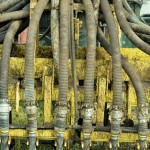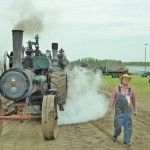account_id=”2206156280001″ player_id=”ryGLIkmv”] Abdelkader Hamici, from Algeria, buys durum to make couscous and pasta.[/caption] Abdelkader Hamici, deputy general manager of Algerian processor Sosemie Eurl said he expects his country’s durum imports will rise to two million tonnes this year from 1.2 million because local production is down. Most of those imports will come from Canada. For

VIDEO: Canadian durum exports still the best, but less consistent
Poor international durum yields mean more business for Canadian grain

Small-scale producers want regs re-evaluated
Supply management limits and restrictions on advertising were among the concerns
Producers attending public consultations on small-scale food production last week had a consistent message — the current system prohibits their success, and food safety rules and regulations need to be re-evaluated. Not everyone is so lucky. Monika Zinn, a small-scale mixed-livestock producer in Springfield, raises and directly markets chickens. She was not grandfathered. She said

PED virus costly for manure applicators
Applicators taking extra precautions and spending more time washing equipment
Much is still not known about the porcine epidemic diarrhea virus infiltrating the pork industry. Researchers are investigating the virus’s survivability, but what they do know is that PED thrives in wet, cold environments and is spread by fecal-oral contact. Manure applicators, like others working near or with the pigs, are taking extra precautions to

New federal funding for beaver control
Rural municipality politicians are concerned about unrealistic expectations
Beavers might be Canadian icons, but the buck-toothed mammals are a growing concern for some Manitoba rural municipalities. The furry nuisances topple trees and plug culverts, flooding towns and farmland. A new beaver-control program brings good news for farmers, but is troubling for municipal politicians in problem areas, who are concerned the program has unrealistic

Soybean acreage increase in southwest Manitoba
More and more farmers turning to soybeans for their ability to withstand excess moisture
Boissevain-area farmer Ben Heide was looking for an alternative to peas when he tried growing soybeans for the first time three years ago. His field peas were struggling with root rot. As well, his family was trying to grow less canola and wanted to spread out their labour. Soybeans seemed like an obvious choice as

New PEDv study looks at manure pits
Researchers want to know whether the virus is lurking in manure pits and how long it can survive
Researchers are hoping the province’s manure pits will hold some clues to controlling the porcine epidemic diarrhea (PED) virus. The council, the Manitoba Livestock Manure Management Initiative and Manitoba Agriculture, Food and Rural Development are asking producers to submit manure samples to help assesses where the virus could be lurking and how long it survives.

Manure improves organic forage-grain crop production
‘Experimental lakes of agriculture’ find organic crops can produce on par with conventional crops
Organic crop producers can match the productivity of their conventional farming neighbours with a little help from some four-legged friends. Composted beef and dairy manure restores important nutrients that can be mined from the soil under organic management systems, Martin Entz, an agronomy professor with the University of Manitoba’s Glenlea research station told participants in

Threshermen remember farming during wartime
First World War and Second World War changed the way we farm
Jim Down, 64, remembers hearing stories of the time his Uncle Art returned from the war to help with threshing on the farm. Down’s father, only five at the time, wore a small uniform, fashioned by his sisters, for the occasion. “We have pictures from the old photo albums of Uncle Art standing beside our


